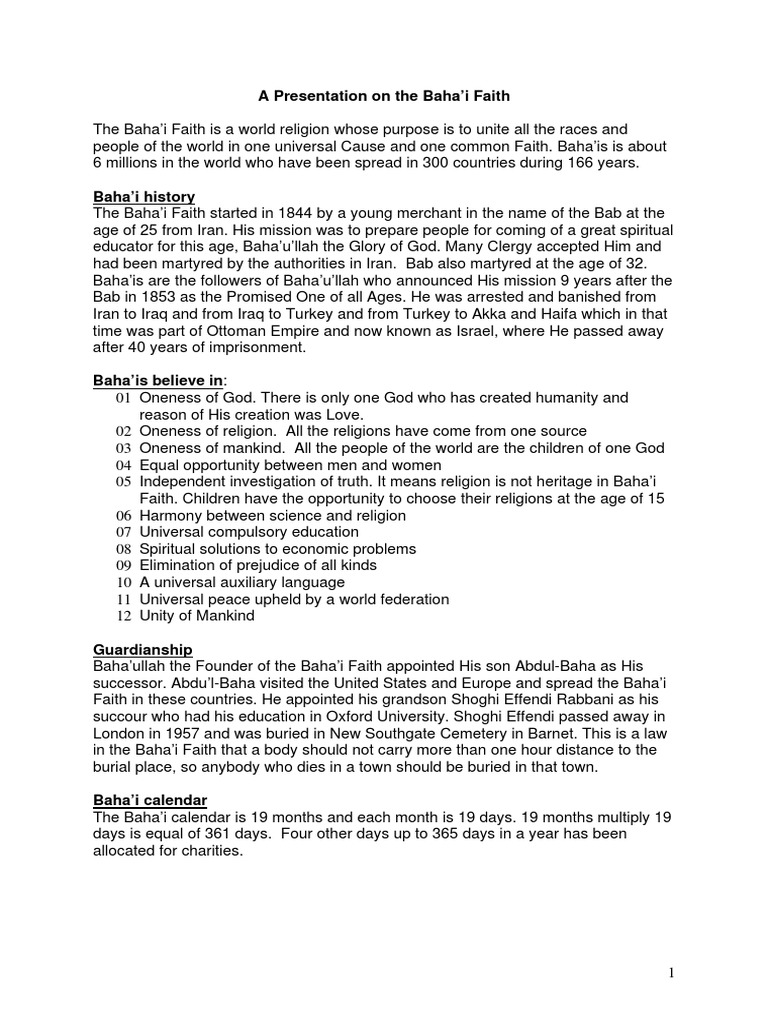The Bahá’í Faith, rooted in the principles of unity and the progression of human understanding, posits that children possess an innate yearning for spiritual guidance and moral anchorage. Delving into the assertion that “children need religion,” it becomes imperative to illuminate the paradigm through which Bahá’í teachings address the holistic development of youth, nourishing their physical, mental, and spiritual dimensions.
To embark on this exploration, we can liken the upbringing of children to the cultivation of a garden. Just as a gardener delicately tends to each seedling, providing it with water, sunlight, and nutrients, so too must caretakers nurture the children in their charge, ensuring that they flourish into resilient, well-rounded individuals. The metaphoric garden represents the myriad influences surrounding a child—family, education, and community—while religion offers the essential sustenance that enables these influences to harmonize and resonate within a deeper spiritual context.
At the genesis of Bahá’í teachings regarding children and religion is the recognition that children are not merely passive recipients of belief; they are, rather, active participants in their spiritual journeys. This participatory ethos is intrinsically interwoven through Bahá’í principles, which emphasize that education should be both moral and intellectual. Spiritual education fosters a sense of purpose and instills ethical values that guide behavior, shaping children into compassionate and conscientious adults. The Bahá’í Faith implores us to prepare young minds for life’s complexities by cultivating virtues such as kindness, responsibility, and service to humanity from an early age.
The nurturing of moral character through religion provides children with a participatory framework that invites them to contemplate their place within the vast tapestry of human existence. In this sense, the teachings illuminate singular qualities that discern the Bahá’í perspective. The concept of a “global family” reinforces the idea that children are not merely connected to their immediate kin but are part of a larger, interconnected universe. This awareness fosters empathy, enabling children to grow into ambassadors of goodwill and unity.
Cognizant of the diverse psychological landscapes through which children traverse, the Bahá’í perspective underscores the importance of adaptive methodologies in religious instruction. Religion, as envisaged by the Bahá’í teachings, should not be a dogged adherence to tradition; rather, it must evolve to resonate with the current zeitgeist. This adaptability enables children to engage with spirituality through various modalities—art, music, storytelling—thereby fostering deep-rooted connections with their beliefs.
Moreover, the Bahá’í writings encourage the embracement of reason and inquiry in the spiritual development of children. Faith, according to Bahá’í principles, is not meant to stifle curiosity but to enhance it. When children are encouraged to ask questions and explore answers, they are empowered to develop a personal understanding of their faith. This approach to religion transforms it from a mere set of rigid doctrines into a living, breathing entity that can evolve alongside the individual’s journey. This dynamic interplay between inquiry and belief serves to create a fertile ground for spiritual growth.
In the Bahá’í framework, the community serves as a pivotal entity for religious upbringing. It acts as a scaffold upon which individual beliefs can be nurtured and examined. Engaging with peers in a spiritually nurturing environment reinforces the values imparted at home, creating a symbiotic relationship between familial and community teachings. The reinforcement of shared values through communal activities—such as children’s classes, study circles, and service projects—culminates in the creation of a supportive network that fosters growth and understanding.
Critically, Bahá’í teachings aspire to imbue children with a sense of service and responsibility towards others. The notion that personal spiritual development is intrinsically tied to the betterment of society serves as a cornerstone of Bahá’í doctrine. By adopting a worldview that transcends individualism, children learn early on the significance of contributing to the welfare of the global community. This perspective beholds service as not just an act of charity but as a duty of collective humanity, thereby fostering a sense of interconnectedness.
In conclusion, Bahá’í teachings profoundly illuminate the imperative that children need religion—a panacea that nourishes their spiritual, moral, and intellectual growth. Through the metaphor of a garden, the importance of fostering a nurturing environment is elucidated, emphasizing the roles of family, community, and inquiry in the spiritual development of youth. As children cultivate their understanding of faith, they emerge not only as individuals enriched by their beliefs but as agents of positive change in their communities. Ultimately, the Bahá’í perspective envisions a generation poised to wield the transformative power of unity, guided by the principles of love, justice, and service. In this light, children do not merely inherit the tenets of religion; they embody them, cultivating a rich tapestry of overarchingly profound and abiding human values.
